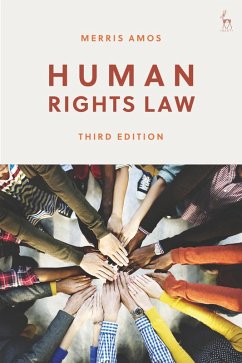Merris Amos
Human Rights Law (eBook, ePUB)
48,95 €
48,95 €
inkl. MwSt.
Sofort per Download lieferbar

24 °P sammeln
48,95 €
Als Download kaufen

48,95 €
inkl. MwSt.
Sofort per Download lieferbar

24 °P sammeln
Jetzt verschenken
Alle Infos zum eBook verschenken
48,95 €
inkl. MwSt.
Sofort per Download lieferbar
Alle Infos zum eBook verschenken

24 °P sammeln
Merris Amos
Human Rights Law (eBook, ePUB)
- Format: ePub
- Merkliste
- Auf die Merkliste
- Bewerten Bewerten
- Teilen
- Produkt teilen
- Produkterinnerung
- Produkterinnerung

Bitte loggen Sie sich zunächst in Ihr Kundenkonto ein oder registrieren Sie sich bei
bücher.de, um das eBook-Abo tolino select nutzen zu können.
Hier können Sie sich einloggen
Hier können Sie sich einloggen
Sie sind bereits eingeloggt. Klicken Sie auf 2. tolino select Abo, um fortzufahren.

Bitte loggen Sie sich zunächst in Ihr Kundenkonto ein oder registrieren Sie sich bei bücher.de, um das eBook-Abo tolino select nutzen zu können.
This textbook comprehensively examines and analyses the interpretation and application of the United Kingdom's Human Rights Act 1998. The third edition has been fully updated to include the last seven years of case law.
Part I covers key procedural issues including: the background to the Act; the relationship between UK courts and the European Court of Human Rights; the definition of victim and public authority; determining incompatibility including deference and proportionality; the impact of the Act on primary legislation; and damages and other remedies for the violation of Convention…mehr
- Geräte: eReader
- mit Kopierschutz
- eBook Hilfe
- Größe: 1.54MB
Andere Kunden interessierten sich auch für
![Freedom of Expression in Islam (eBook, ePUB) Freedom of Expression in Islam (eBook, ePUB)]() Freedom of Expression in Islam (eBook, ePUB)21,95 €
Freedom of Expression in Islam (eBook, ePUB)21,95 €![Social Rights and the Constitutional Moment (eBook, ePUB) Social Rights and the Constitutional Moment (eBook, ePUB)]() Social Rights and the Constitutional Moment (eBook, ePUB)36,95 €
Social Rights and the Constitutional Moment (eBook, ePUB)36,95 €![Law Express Question and Answer: Human Rights (eBook, ePUB) Law Express Question and Answer: Human Rights (eBook, ePUB)]() Howard DavisLaw Express Question and Answer: Human Rights (eBook, ePUB)10,95 €
Howard DavisLaw Express Question and Answer: Human Rights (eBook, ePUB)10,95 €![The Age of Dignity (eBook, ePUB) The Age of Dignity (eBook, ePUB)]() Catherine DupréThe Age of Dignity (eBook, ePUB)26,95 €
Catherine DupréThe Age of Dignity (eBook, ePUB)26,95 €![The Narrow Corridor (eBook, ePUB) The Narrow Corridor (eBook, ePUB)]() Daron AcemogluThe Narrow Corridor (eBook, ePUB)10,99 €
Daron AcemogluThe Narrow Corridor (eBook, ePUB)10,99 €![Human Rights and Judicial Review in Australia and Canada (eBook, ePUB) Human Rights and Judicial Review in Australia and Canada (eBook, ePUB)]() Janina BougheyHuman Rights and Judicial Review in Australia and Canada (eBook, ePUB)39,95 €
Janina BougheyHuman Rights and Judicial Review in Australia and Canada (eBook, ePUB)39,95 €![Human Rights in the UK and the Influence of Foreign Jurisprudence (eBook, ePUB) Human Rights in the UK and the Influence of Foreign Jurisprudence (eBook, ePUB)]() Hélène TyrrellHuman Rights in the UK and the Influence of Foreign Jurisprudence (eBook, ePUB)34,95 €
Hélène TyrrellHuman Rights in the UK and the Influence of Foreign Jurisprudence (eBook, ePUB)34,95 €-
-
-
This textbook comprehensively examines and analyses the interpretation and application of the United Kingdom's Human Rights Act 1998. The third edition has been fully updated to include the last seven years of case law.
Part I covers key procedural issues including: the background to the Act; the relationship between UK courts and the European Court of Human Rights; the definition of victim and public authority; determining incompatibility including deference and proportionality; the impact of the Act on primary legislation; and damages and other remedies for the violation of Convention rights.
In Part II of the book, the Convention rights, as interpreted and applied by United Kingdom courts, are examined in detail. All of the key Convention rights are discussed including: the right to life; freedom from torture and inhuman or degrading treatment or punishment; the right to liberty; fair trial; the rights to private life, family life and home; freedom of religion and belief; freedom of expression; the right to peaceful enjoyment of possessions; and the right to freedom from discrimination in the enjoyment of Convention rights.
The third edition of Human Rights Law will be invaluable for those teaching, studying and practising in the areas of United Kingdom human rights law, constitutional law and administrative law.
Part I covers key procedural issues including: the background to the Act; the relationship between UK courts and the European Court of Human Rights; the definition of victim and public authority; determining incompatibility including deference and proportionality; the impact of the Act on primary legislation; and damages and other remedies for the violation of Convention rights.
In Part II of the book, the Convention rights, as interpreted and applied by United Kingdom courts, are examined in detail. All of the key Convention rights are discussed including: the right to life; freedom from torture and inhuman or degrading treatment or punishment; the right to liberty; fair trial; the rights to private life, family life and home; freedom of religion and belief; freedom of expression; the right to peaceful enjoyment of possessions; and the right to freedom from discrimination in the enjoyment of Convention rights.
The third edition of Human Rights Law will be invaluable for those teaching, studying and practising in the areas of United Kingdom human rights law, constitutional law and administrative law.
Produktdetails
- Produktdetails
- Verlag: Bloomsbury UK eBooks
- Seitenzahl: 832
- Erscheinungstermin: 15. Juli 2021
- Englisch
- ISBN-13: 9781509933303
- Artikelnr.: 62249659
- Verlag: Bloomsbury UK eBooks
- Seitenzahl: 832
- Erscheinungstermin: 15. Juli 2021
- Englisch
- ISBN-13: 9781509933303
- Artikelnr.: 62249659
- Herstellerkennzeichnung Die Herstellerinformationen sind derzeit nicht verfügbar.
Merris Amos is Profesor of Human Rights Law at Queen Mary, University of London. She has many years of experience in researching and teaching human rights law and has published widely in the area. Her particular area of expertise is the United Kingdom's Human Rights Act.
PART I
THE HUMAN RIGHTS ACT
1. Background and Interpretation
1. The Protection of Human Rights Prior to the Human Rights Act
2. Background to the Human Rights Act
3. Purpose of the Human Rights Act
4. Structure of the Human Rights Act
5. Convention Rights given Further Effect
6. Principles of Interpretation
7. UK Courts and the European Court of Human Rights
8. Other Aids to Interpretation
9. The Protection of Human Rights via the Common Law and EU Law
10. Reform of the Human Rights Act
2. The Benefit and Burden of the Human Rights Act
1. Introduction
2. The Benefit of Convention Rights: Victims
3. The Burden of Convention Rights: Public Authorities
4. Core Public Authorities
5. Hybrid Public Authorities
6. Private Bodies
3. The 'Acts' to which the Human Rights Act Applies
1. Introduction
2. Limitation Period
3. Retrospective Effect
4. Acts which Occur Outside of the United Kingdom: Extra-territorial Effect
5. Failure to Act: Positive Duties
6. Satellite Litigation
4. Determining Incompatibility
1. Introduction
2. Prescribed by Law
3. Necessary
4. Proportionality
5. Deference
6. Deference in Practice
5. The Defence of Primary Legislation
1. Introduction
2. Section 6(2) Human Rights Act
3. Section 3 Human Rights Act
4. Section 4 Human Rights Act
5. Subordinate (Secondary) Legislation
6. The Use of Hansard and Other Materials in Compatibility Cases
7. Section 19 Human Rights Act: Statements of Compatibility
6. Remedies
1. Introduction
2. Just and Appropriate
3. Effective
4. The Power to Award Damages
5. Court Must have the Power to Award Damages
6. Just Satisfaction
7. The Principles Applied by the European Court of Human Rights
8. The Level of Damages
9. Damages: Article 2
10. Damages: Article 3
11. Damages: Article 5
12. Damages: Article 6
13. Damages: Article 8
14. Damages: Article 14
PART II
THE CONVENTION RIGHTS
7. Article 2: The Right to Life
1. Introduction
2. Scope
3. Definition of 'Life'
4. Intentional Deprivation of Life
5. The Positive Duty to Safeguard Life - Operational Duty
6. Positive Duty to Safeguard Life - Framework Duty
7. Duty to Investigate Deaths
8. Exceptions - Article 2(2)
8. Article 3: Prohibition of Torture and Inhuman or Degrading Treatment or
Punishment
1. Introduction
2. Inhuman or Degrading Treatment - Severity
3. The Positive Duty to Protect from Article 3 Ill-Treatment - Operational
Duty
4. Positive Duty to Protect from Article 3 Ill-Treatment - Framework Duty
5. Duty to Investigate Article 3 Ill-Treatment
6. Physical Integrity
7. Conditions of Detention and Treatment of Detainees
8. Violence and Threatening Behaviour
9. Sentencing
10. State Support
11. Removal, Deportation and Extradition
9. Article 5: The Right to Liberty and Security
1. Introduction
2. What Constitutes a Deprivation of Liberty?
3. Article 5(1)
4. Article 5(2): Reasons for Arrest
5. Article 5(3)
6. Article 5(4)
7. Article 5(5): Enforceable Right to Compensation
10. Article 6: The Right to a Fair Trial
1. Introduction
2. Removal, Deportation and Extradition
3. Article 6(1) Application: Determination of Civil Rights and Obligations
4. Article 6(1) Application: Determination of Any Criminal Charge
5. Access to Court
6. Fair Hearing
7. Public Hearing and Public Pronouncement
8. Reasonable Time
9. Independent and Impartial Tribunal
10. Tribunal Established by Law
11. Article 6(2): Presumption of Innocence
12. Article 6(3)(a): Informed of the Nature and Cause of the Accusation
13. Article 6(3)(b): Adequate Time and Facilities for Preparation of
Defence
14. Article 6(3)(c): Legal Assistance
15. Article 6(3)(d): Witnesses
16. Article 6(3)(e): Interpreter
11. Article 8: The Right to Respect for Private Life
1. Introduction
2. Who Must Respect Private Life? The Development of Tort Law
3. Private Life
4. Positive Duties
5. Permitted Interferences
6. National Security
7. Economic Well-being of the Country
8. Prevention of Disorder or Crime
9. Protection of Health
10. Protection of Morals
11. Protection of the Rights and Freedoms of Others
12. Article 8: The Right to Respect for Family Life
1. Introduction
2. Family Life
3. Interference
4. Permitted Interferences
5. Economic Well-being of the Country
6. Prevention of Disorder or Crime
7. Protection of the Rights and Freedoms of Others
13. Article 8: The Right to Respect for Home
1. Introduction
2. Home
3. Interference
4. Positive Duties
5. Justifying an Interference with the Right to Respect for Home
6. For the Prevention of Disorder or Crime
7. Economic Well-being of the Country
8. Protection of the Rights and Freedoms of Others
14. Article 9: Freedom of Thought, Conscience and Religion
1. Introduction
2. The Right to Believe
3. The Right to Manifest
4. Interference with Manifestation of Belief
5. Permitted Interferences with the Right to Manifest
15. Article 10: The Right to Freedom of Expression
1. Introduction
2. Expression
3. Medium, Manner and Timing of Communication
4. Freedom to Receive and Impart Information and Ideas
5. Interference
6. Positive Duties
7. Permitted Interferences - Generally
8. Proportionality - General Principles
9. National Security
10. Prevention of Disorder or Crime
11. Protection of Health or Morals
12. Protection of the Reputation of Others
13. Protection of the Rights of Others
14. Preventing the Disclosure of Information Received in Confidence
15. Maintaining the Authority and Impartiality of the Judiciary
16. Article 14: Prohibition of Discrimination
1. Introduction
2. Application: No Independent Existence
3. Without Discrimination
4. Grounds of Prohibited Discrimination
5. Analogous Position - Comparators
6. Objective and Reasonable Justification
7. Remedy for Breach
8. Positive Duties
17. Article 1 of Protocol No 1: Protection of Property
1. Introduction
2. Possessions
3. Interferences with the Peaceful Enjoyment of Possessions
4. Justifying Interferences
5. Consumer Protection
6. Planning and the Environment
7. The Rights of Others - Article 1 of Protocol 1
8. Social Justice
9. Protection of Morals
10. Prevention of Crime and Illegality
11. Economic Well-being of the Country
12. Reduction of the National Budget Deficit
THE HUMAN RIGHTS ACT
1. Background and Interpretation
1. The Protection of Human Rights Prior to the Human Rights Act
2. Background to the Human Rights Act
3. Purpose of the Human Rights Act
4. Structure of the Human Rights Act
5. Convention Rights given Further Effect
6. Principles of Interpretation
7. UK Courts and the European Court of Human Rights
8. Other Aids to Interpretation
9. The Protection of Human Rights via the Common Law and EU Law
10. Reform of the Human Rights Act
2. The Benefit and Burden of the Human Rights Act
1. Introduction
2. The Benefit of Convention Rights: Victims
3. The Burden of Convention Rights: Public Authorities
4. Core Public Authorities
5. Hybrid Public Authorities
6. Private Bodies
3. The 'Acts' to which the Human Rights Act Applies
1. Introduction
2. Limitation Period
3. Retrospective Effect
4. Acts which Occur Outside of the United Kingdom: Extra-territorial Effect
5. Failure to Act: Positive Duties
6. Satellite Litigation
4. Determining Incompatibility
1. Introduction
2. Prescribed by Law
3. Necessary
4. Proportionality
5. Deference
6. Deference in Practice
5. The Defence of Primary Legislation
1. Introduction
2. Section 6(2) Human Rights Act
3. Section 3 Human Rights Act
4. Section 4 Human Rights Act
5. Subordinate (Secondary) Legislation
6. The Use of Hansard and Other Materials in Compatibility Cases
7. Section 19 Human Rights Act: Statements of Compatibility
6. Remedies
1. Introduction
2. Just and Appropriate
3. Effective
4. The Power to Award Damages
5. Court Must have the Power to Award Damages
6. Just Satisfaction
7. The Principles Applied by the European Court of Human Rights
8. The Level of Damages
9. Damages: Article 2
10. Damages: Article 3
11. Damages: Article 5
12. Damages: Article 6
13. Damages: Article 8
14. Damages: Article 14
PART II
THE CONVENTION RIGHTS
7. Article 2: The Right to Life
1. Introduction
2. Scope
3. Definition of 'Life'
4. Intentional Deprivation of Life
5. The Positive Duty to Safeguard Life - Operational Duty
6. Positive Duty to Safeguard Life - Framework Duty
7. Duty to Investigate Deaths
8. Exceptions - Article 2(2)
8. Article 3: Prohibition of Torture and Inhuman or Degrading Treatment or
Punishment
1. Introduction
2. Inhuman or Degrading Treatment - Severity
3. The Positive Duty to Protect from Article 3 Ill-Treatment - Operational
Duty
4. Positive Duty to Protect from Article 3 Ill-Treatment - Framework Duty
5. Duty to Investigate Article 3 Ill-Treatment
6. Physical Integrity
7. Conditions of Detention and Treatment of Detainees
8. Violence and Threatening Behaviour
9. Sentencing
10. State Support
11. Removal, Deportation and Extradition
9. Article 5: The Right to Liberty and Security
1. Introduction
2. What Constitutes a Deprivation of Liberty?
3. Article 5(1)
4. Article 5(2): Reasons for Arrest
5. Article 5(3)
6. Article 5(4)
7. Article 5(5): Enforceable Right to Compensation
10. Article 6: The Right to a Fair Trial
1. Introduction
2. Removal, Deportation and Extradition
3. Article 6(1) Application: Determination of Civil Rights and Obligations
4. Article 6(1) Application: Determination of Any Criminal Charge
5. Access to Court
6. Fair Hearing
7. Public Hearing and Public Pronouncement
8. Reasonable Time
9. Independent and Impartial Tribunal
10. Tribunal Established by Law
11. Article 6(2): Presumption of Innocence
12. Article 6(3)(a): Informed of the Nature and Cause of the Accusation
13. Article 6(3)(b): Adequate Time and Facilities for Preparation of
Defence
14. Article 6(3)(c): Legal Assistance
15. Article 6(3)(d): Witnesses
16. Article 6(3)(e): Interpreter
11. Article 8: The Right to Respect for Private Life
1. Introduction
2. Who Must Respect Private Life? The Development of Tort Law
3. Private Life
4. Positive Duties
5. Permitted Interferences
6. National Security
7. Economic Well-being of the Country
8. Prevention of Disorder or Crime
9. Protection of Health
10. Protection of Morals
11. Protection of the Rights and Freedoms of Others
12. Article 8: The Right to Respect for Family Life
1. Introduction
2. Family Life
3. Interference
4. Permitted Interferences
5. Economic Well-being of the Country
6. Prevention of Disorder or Crime
7. Protection of the Rights and Freedoms of Others
13. Article 8: The Right to Respect for Home
1. Introduction
2. Home
3. Interference
4. Positive Duties
5. Justifying an Interference with the Right to Respect for Home
6. For the Prevention of Disorder or Crime
7. Economic Well-being of the Country
8. Protection of the Rights and Freedoms of Others
14. Article 9: Freedom of Thought, Conscience and Religion
1. Introduction
2. The Right to Believe
3. The Right to Manifest
4. Interference with Manifestation of Belief
5. Permitted Interferences with the Right to Manifest
15. Article 10: The Right to Freedom of Expression
1. Introduction
2. Expression
3. Medium, Manner and Timing of Communication
4. Freedom to Receive and Impart Information and Ideas
5. Interference
6. Positive Duties
7. Permitted Interferences - Generally
8. Proportionality - General Principles
9. National Security
10. Prevention of Disorder or Crime
11. Protection of Health or Morals
12. Protection of the Reputation of Others
13. Protection of the Rights of Others
14. Preventing the Disclosure of Information Received in Confidence
15. Maintaining the Authority and Impartiality of the Judiciary
16. Article 14: Prohibition of Discrimination
1. Introduction
2. Application: No Independent Existence
3. Without Discrimination
4. Grounds of Prohibited Discrimination
5. Analogous Position - Comparators
6. Objective and Reasonable Justification
7. Remedy for Breach
8. Positive Duties
17. Article 1 of Protocol No 1: Protection of Property
1. Introduction
2. Possessions
3. Interferences with the Peaceful Enjoyment of Possessions
4. Justifying Interferences
5. Consumer Protection
6. Planning and the Environment
7. The Rights of Others - Article 1 of Protocol 1
8. Social Justice
9. Protection of Morals
10. Prevention of Crime and Illegality
11. Economic Well-being of the Country
12. Reduction of the National Budget Deficit
PART I
THE HUMAN RIGHTS ACT
1. Background and Interpretation
1. The Protection of Human Rights Prior to the Human Rights Act
2. Background to the Human Rights Act
3. Purpose of the Human Rights Act
4. Structure of the Human Rights Act
5. Convention Rights given Further Effect
6. Principles of Interpretation
7. UK Courts and the European Court of Human Rights
8. Other Aids to Interpretation
9. The Protection of Human Rights via the Common Law and EU Law
10. Reform of the Human Rights Act
2. The Benefit and Burden of the Human Rights Act
1. Introduction
2. The Benefit of Convention Rights: Victims
3. The Burden of Convention Rights: Public Authorities
4. Core Public Authorities
5. Hybrid Public Authorities
6. Private Bodies
3. The 'Acts' to which the Human Rights Act Applies
1. Introduction
2. Limitation Period
3. Retrospective Effect
4. Acts which Occur Outside of the United Kingdom: Extra-territorial Effect
5. Failure to Act: Positive Duties
6. Satellite Litigation
4. Determining Incompatibility
1. Introduction
2. Prescribed by Law
3. Necessary
4. Proportionality
5. Deference
6. Deference in Practice
5. The Defence of Primary Legislation
1. Introduction
2. Section 6(2) Human Rights Act
3. Section 3 Human Rights Act
4. Section 4 Human Rights Act
5. Subordinate (Secondary) Legislation
6. The Use of Hansard and Other Materials in Compatibility Cases
7. Section 19 Human Rights Act: Statements of Compatibility
6. Remedies
1. Introduction
2. Just and Appropriate
3. Effective
4. The Power to Award Damages
5. Court Must have the Power to Award Damages
6. Just Satisfaction
7. The Principles Applied by the European Court of Human Rights
8. The Level of Damages
9. Damages: Article 2
10. Damages: Article 3
11. Damages: Article 5
12. Damages: Article 6
13. Damages: Article 8
14. Damages: Article 14
PART II
THE CONVENTION RIGHTS
7. Article 2: The Right to Life
1. Introduction
2. Scope
3. Definition of 'Life'
4. Intentional Deprivation of Life
5. The Positive Duty to Safeguard Life - Operational Duty
6. Positive Duty to Safeguard Life - Framework Duty
7. Duty to Investigate Deaths
8. Exceptions - Article 2(2)
8. Article 3: Prohibition of Torture and Inhuman or Degrading Treatment or
Punishment
1. Introduction
2. Inhuman or Degrading Treatment - Severity
3. The Positive Duty to Protect from Article 3 Ill-Treatment - Operational
Duty
4. Positive Duty to Protect from Article 3 Ill-Treatment - Framework Duty
5. Duty to Investigate Article 3 Ill-Treatment
6. Physical Integrity
7. Conditions of Detention and Treatment of Detainees
8. Violence and Threatening Behaviour
9. Sentencing
10. State Support
11. Removal, Deportation and Extradition
9. Article 5: The Right to Liberty and Security
1. Introduction
2. What Constitutes a Deprivation of Liberty?
3. Article 5(1)
4. Article 5(2): Reasons for Arrest
5. Article 5(3)
6. Article 5(4)
7. Article 5(5): Enforceable Right to Compensation
10. Article 6: The Right to a Fair Trial
1. Introduction
2. Removal, Deportation and Extradition
3. Article 6(1) Application: Determination of Civil Rights and Obligations
4. Article 6(1) Application: Determination of Any Criminal Charge
5. Access to Court
6. Fair Hearing
7. Public Hearing and Public Pronouncement
8. Reasonable Time
9. Independent and Impartial Tribunal
10. Tribunal Established by Law
11. Article 6(2): Presumption of Innocence
12. Article 6(3)(a): Informed of the Nature and Cause of the Accusation
13. Article 6(3)(b): Adequate Time and Facilities for Preparation of
Defence
14. Article 6(3)(c): Legal Assistance
15. Article 6(3)(d): Witnesses
16. Article 6(3)(e): Interpreter
11. Article 8: The Right to Respect for Private Life
1. Introduction
2. Who Must Respect Private Life? The Development of Tort Law
3. Private Life
4. Positive Duties
5. Permitted Interferences
6. National Security
7. Economic Well-being of the Country
8. Prevention of Disorder or Crime
9. Protection of Health
10. Protection of Morals
11. Protection of the Rights and Freedoms of Others
12. Article 8: The Right to Respect for Family Life
1. Introduction
2. Family Life
3. Interference
4. Permitted Interferences
5. Economic Well-being of the Country
6. Prevention of Disorder or Crime
7. Protection of the Rights and Freedoms of Others
13. Article 8: The Right to Respect for Home
1. Introduction
2. Home
3. Interference
4. Positive Duties
5. Justifying an Interference with the Right to Respect for Home
6. For the Prevention of Disorder or Crime
7. Economic Well-being of the Country
8. Protection of the Rights and Freedoms of Others
14. Article 9: Freedom of Thought, Conscience and Religion
1. Introduction
2. The Right to Believe
3. The Right to Manifest
4. Interference with Manifestation of Belief
5. Permitted Interferences with the Right to Manifest
15. Article 10: The Right to Freedom of Expression
1. Introduction
2. Expression
3. Medium, Manner and Timing of Communication
4. Freedom to Receive and Impart Information and Ideas
5. Interference
6. Positive Duties
7. Permitted Interferences - Generally
8. Proportionality - General Principles
9. National Security
10. Prevention of Disorder or Crime
11. Protection of Health or Morals
12. Protection of the Reputation of Others
13. Protection of the Rights of Others
14. Preventing the Disclosure of Information Received in Confidence
15. Maintaining the Authority and Impartiality of the Judiciary
16. Article 14: Prohibition of Discrimination
1. Introduction
2. Application: No Independent Existence
3. Without Discrimination
4. Grounds of Prohibited Discrimination
5. Analogous Position - Comparators
6. Objective and Reasonable Justification
7. Remedy for Breach
8. Positive Duties
17. Article 1 of Protocol No 1: Protection of Property
1. Introduction
2. Possessions
3. Interferences with the Peaceful Enjoyment of Possessions
4. Justifying Interferences
5. Consumer Protection
6. Planning and the Environment
7. The Rights of Others - Article 1 of Protocol 1
8. Social Justice
9. Protection of Morals
10. Prevention of Crime and Illegality
11. Economic Well-being of the Country
12. Reduction of the National Budget Deficit
THE HUMAN RIGHTS ACT
1. Background and Interpretation
1. The Protection of Human Rights Prior to the Human Rights Act
2. Background to the Human Rights Act
3. Purpose of the Human Rights Act
4. Structure of the Human Rights Act
5. Convention Rights given Further Effect
6. Principles of Interpretation
7. UK Courts and the European Court of Human Rights
8. Other Aids to Interpretation
9. The Protection of Human Rights via the Common Law and EU Law
10. Reform of the Human Rights Act
2. The Benefit and Burden of the Human Rights Act
1. Introduction
2. The Benefit of Convention Rights: Victims
3. The Burden of Convention Rights: Public Authorities
4. Core Public Authorities
5. Hybrid Public Authorities
6. Private Bodies
3. The 'Acts' to which the Human Rights Act Applies
1. Introduction
2. Limitation Period
3. Retrospective Effect
4. Acts which Occur Outside of the United Kingdom: Extra-territorial Effect
5. Failure to Act: Positive Duties
6. Satellite Litigation
4. Determining Incompatibility
1. Introduction
2. Prescribed by Law
3. Necessary
4. Proportionality
5. Deference
6. Deference in Practice
5. The Defence of Primary Legislation
1. Introduction
2. Section 6(2) Human Rights Act
3. Section 3 Human Rights Act
4. Section 4 Human Rights Act
5. Subordinate (Secondary) Legislation
6. The Use of Hansard and Other Materials in Compatibility Cases
7. Section 19 Human Rights Act: Statements of Compatibility
6. Remedies
1. Introduction
2. Just and Appropriate
3. Effective
4. The Power to Award Damages
5. Court Must have the Power to Award Damages
6. Just Satisfaction
7. The Principles Applied by the European Court of Human Rights
8. The Level of Damages
9. Damages: Article 2
10. Damages: Article 3
11. Damages: Article 5
12. Damages: Article 6
13. Damages: Article 8
14. Damages: Article 14
PART II
THE CONVENTION RIGHTS
7. Article 2: The Right to Life
1. Introduction
2. Scope
3. Definition of 'Life'
4. Intentional Deprivation of Life
5. The Positive Duty to Safeguard Life - Operational Duty
6. Positive Duty to Safeguard Life - Framework Duty
7. Duty to Investigate Deaths
8. Exceptions - Article 2(2)
8. Article 3: Prohibition of Torture and Inhuman or Degrading Treatment or
Punishment
1. Introduction
2. Inhuman or Degrading Treatment - Severity
3. The Positive Duty to Protect from Article 3 Ill-Treatment - Operational
Duty
4. Positive Duty to Protect from Article 3 Ill-Treatment - Framework Duty
5. Duty to Investigate Article 3 Ill-Treatment
6. Physical Integrity
7. Conditions of Detention and Treatment of Detainees
8. Violence and Threatening Behaviour
9. Sentencing
10. State Support
11. Removal, Deportation and Extradition
9. Article 5: The Right to Liberty and Security
1. Introduction
2. What Constitutes a Deprivation of Liberty?
3. Article 5(1)
4. Article 5(2): Reasons for Arrest
5. Article 5(3)
6. Article 5(4)
7. Article 5(5): Enforceable Right to Compensation
10. Article 6: The Right to a Fair Trial
1. Introduction
2. Removal, Deportation and Extradition
3. Article 6(1) Application: Determination of Civil Rights and Obligations
4. Article 6(1) Application: Determination of Any Criminal Charge
5. Access to Court
6. Fair Hearing
7. Public Hearing and Public Pronouncement
8. Reasonable Time
9. Independent and Impartial Tribunal
10. Tribunal Established by Law
11. Article 6(2): Presumption of Innocence
12. Article 6(3)(a): Informed of the Nature and Cause of the Accusation
13. Article 6(3)(b): Adequate Time and Facilities for Preparation of
Defence
14. Article 6(3)(c): Legal Assistance
15. Article 6(3)(d): Witnesses
16. Article 6(3)(e): Interpreter
11. Article 8: The Right to Respect for Private Life
1. Introduction
2. Who Must Respect Private Life? The Development of Tort Law
3. Private Life
4. Positive Duties
5. Permitted Interferences
6. National Security
7. Economic Well-being of the Country
8. Prevention of Disorder or Crime
9. Protection of Health
10. Protection of Morals
11. Protection of the Rights and Freedoms of Others
12. Article 8: The Right to Respect for Family Life
1. Introduction
2. Family Life
3. Interference
4. Permitted Interferences
5. Economic Well-being of the Country
6. Prevention of Disorder or Crime
7. Protection of the Rights and Freedoms of Others
13. Article 8: The Right to Respect for Home
1. Introduction
2. Home
3. Interference
4. Positive Duties
5. Justifying an Interference with the Right to Respect for Home
6. For the Prevention of Disorder or Crime
7. Economic Well-being of the Country
8. Protection of the Rights and Freedoms of Others
14. Article 9: Freedom of Thought, Conscience and Religion
1. Introduction
2. The Right to Believe
3. The Right to Manifest
4. Interference with Manifestation of Belief
5. Permitted Interferences with the Right to Manifest
15. Article 10: The Right to Freedom of Expression
1. Introduction
2. Expression
3. Medium, Manner and Timing of Communication
4. Freedom to Receive and Impart Information and Ideas
5. Interference
6. Positive Duties
7. Permitted Interferences - Generally
8. Proportionality - General Principles
9. National Security
10. Prevention of Disorder or Crime
11. Protection of Health or Morals
12. Protection of the Reputation of Others
13. Protection of the Rights of Others
14. Preventing the Disclosure of Information Received in Confidence
15. Maintaining the Authority and Impartiality of the Judiciary
16. Article 14: Prohibition of Discrimination
1. Introduction
2. Application: No Independent Existence
3. Without Discrimination
4. Grounds of Prohibited Discrimination
5. Analogous Position - Comparators
6. Objective and Reasonable Justification
7. Remedy for Breach
8. Positive Duties
17. Article 1 of Protocol No 1: Protection of Property
1. Introduction
2. Possessions
3. Interferences with the Peaceful Enjoyment of Possessions
4. Justifying Interferences
5. Consumer Protection
6. Planning and the Environment
7. The Rights of Others - Article 1 of Protocol 1
8. Social Justice
9. Protection of Morals
10. Prevention of Crime and Illegality
11. Economic Well-being of the Country
12. Reduction of the National Budget Deficit







